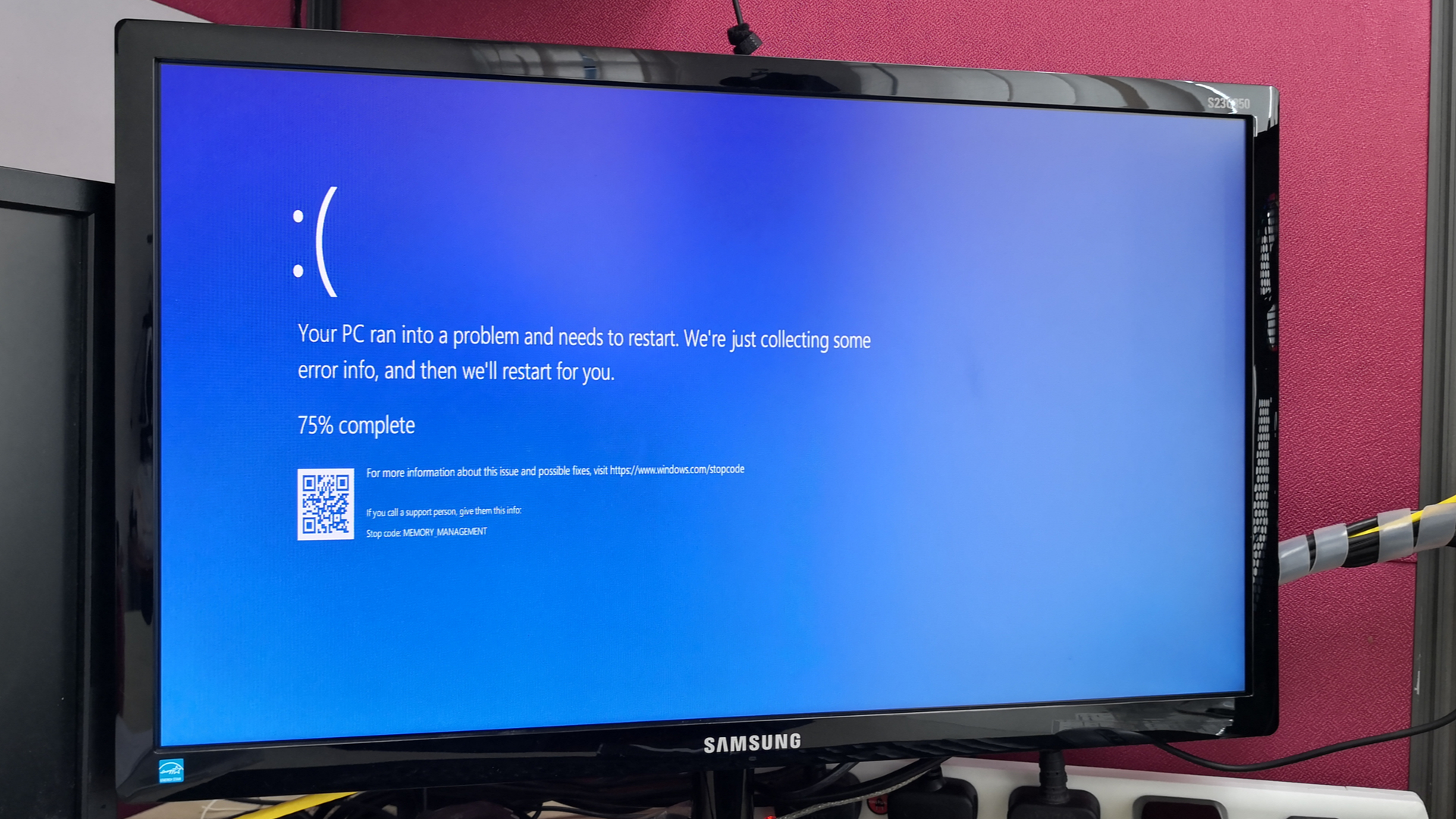Microsoft releases emergency fix for Patch Tuesday Wi-Fi glitch
Users report BSOD system crashes when trying to connect to Wi-Fi through WPA3


Microsoft has issued an out-of-band patch for a blue screen of death (BSOD)-causing glitch introduced with the release of this week’s round of Patch Tuesday security fixes.
Some users have reported their devices crashing following the latest update, according to Windows Latest. Dubbed KB4601315, this round of fixes rectified 56 security flaws in Windows 10, including a critical zero-day vulnerability affecting the win32k component, being actively exploited by hackers in China.
Microsoft acknowledged the rollout of KB4601315 caused the BSOD to appear for a handful of users, revealing that devices stopped working when users attempted to connect to a Wi-Fi network through the Wi-Fi Protected Access 3 (WPA3) protocol.
Users will encounter “stop error 0x7E in nwifi.sys” when they attempt to use a WPA3 connection, the company confirmed. The emergency update, dubbed KB5001028, has now been released and should address the issue.
WPA3 is the most recent version of the security standard for wireless networks, introduced in January 2018. This added a number of improvements to security over WPA2, including stronger encryption and mitigations against weak passwords.
The Windows 10 bug caused by this week’s Patch Tuesday update should not affect too many devices considering WPA3 has yet to be adopted in the mainstream. Many devices with WPA3 support have been manufactured, but organisations and individuals across the world haven’t yet necessarily changed their WPA2 networking equipment.
Although the WPA3 standard isn’t as widely used as it one day will be, Microsoft still deemed this bug severe enough to release an out-of-band fix, something the company only does in emergency situations.
Sign up today and you will receive a free copy of our Future Focus 2025 report - the leading guidance on AI, cybersecurity and other IT challenges as per 700+ senior executives
Previous out-of-band updates have normally been issued to fix critical flaws that render Windows devices vulnerable to exploitation by hackers.
Microsoft released emergency patches for high-risk Windows 10 and Windows Server 2019 remote code execution flaws affecting Windows Codecs Library in July 2020, for example. The firm also issued out-of-band updates to fix two further remote code execution bugs affecting Windows Codecs Library again as well as Visual Studio Code in October.

Keumars Afifi-Sabet is a writer and editor that specialises in public sector, cyber security, and cloud computing. He first joined ITPro as a staff writer in April 2018 and eventually became its Features Editor. Although a regular contributor to other tech sites in the past, these days you will find Keumars on LiveScience, where he runs its Technology section.
-
 What is Microsoft Maia?
What is Microsoft Maia?Explainer Microsoft's in-house chip is planned to a core aspect of Microsoft Copilot and future Azure AI offerings
-
 If Satya Nadella wants us to take AI seriously, let’s forget about mass adoption and start with a return on investment for those already using it
If Satya Nadella wants us to take AI seriously, let’s forget about mass adoption and start with a return on investment for those already using itOpinion If Satya Nadella wants us to take AI seriously, let's start with ROI for businesses
-
 Experts welcome EU-led alternative to MITRE's vulnerability tracking scheme
Experts welcome EU-led alternative to MITRE's vulnerability tracking schemeNews The EU-led framework will reduce reliance on US-based MITRE vulnerability reporting database
-
 Veeam patches Backup & Replication vulnerabilities, urges users to update
Veeam patches Backup & Replication vulnerabilities, urges users to updateNews The vulnerabilities affect Veeam Backup & Replication 13.0.1.180 and all earlier version 13 builds – but not previous versions.
-
 Two Fortinet vulnerabilities are being exploited in the wild – patch now
Two Fortinet vulnerabilities are being exploited in the wild – patch nowNews Arctic Wolf and Rapid7 said security teams should act immediately to mitigate the Fortinet vulnerabilities
-
 Everything you need to know about Google and Apple’s emergency zero-day patches
Everything you need to know about Google and Apple’s emergency zero-day patchesNews A serious zero-day bug was spotted in Chrome systems that impacts Apple users too, forcing both companies to issue emergency patches
-
 The Microsoft bug bounty program just got a big update — and even applies to third-party code
The Microsoft bug bounty program just got a big update — and even applies to third-party codeNews Microsoft is expanding its bug bounty program to cover all of its products, even those that haven't previously been covered by a bounty before and even third-party code.
-
 Security experts claim the CVE Program isn’t up to scratch anymore — inaccurate scores and lengthy delays mean the system needs updated
Security experts claim the CVE Program isn’t up to scratch anymore — inaccurate scores and lengthy delays mean the system needs updatedNews CVE data is vital in combating emerging threats, yet inaccurate ratings and lengthy wait times are placing enterprises at risk
-
 IBM AIX users urged to patch immediately as researchers sound alarm on critical flaws
IBM AIX users urged to patch immediately as researchers sound alarm on critical flawsNews Network administrators should patch the four IBM AIX flaws as soon as possible
-
 Critical Dell Storage Manager flaws could let hackers access sensitive data – patch now
Critical Dell Storage Manager flaws could let hackers access sensitive data – patch nowNews A trio of flaws in Dell Storage Manager has prompted a customer alert